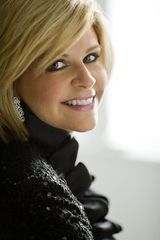|
Back
When a Concert Becomes an Event New York
Isaac Stern Auditorium, Carnegie Hall
04/07/2016 -
Josef Haydn: Symphonies No. 75 in D Major & No. 98 in B Flat Major
Henry Purcell: Bess of Bedlam – Music For A While – Dido And Aeneas: Dido’s Lament
Benjamin Britten: Phaedra, opus 93
Susan Graham (Mezzo-soprano)
Orchestra of St. Luke’s, Nicholas McGegan (Conductor/Harpsichord)

S. Graham (© Dario Acosta)
The only commonality between this era of mezzo-sopranos– Renée and Dawn and Sylvia and Barbara (of course Fleming, Upshaw, McNair and Bonney)–is that they have nothing in common except pure dazzlement. These are singular personalities, unique in drama, voice and personality.
Into that halcyon is of course Susan. Who is of course Susan Graham. We should call her stately, but Ms. Graham is from Texas, so we call her tall and rangy and filled with vitality, vigor, personal humor and vocal qualities that are unfailingly bright.
What she did last night with Benjamin Britten’s penultimate composition, the monodrama Phaedra was hardly the stuff of earthbound reviews. Not able to physically write at this time a few months before his death, Britten dictated the notes. Yet so agonizing was the story of death, from Robert Lowell’s masterful translation from Racine, that a great singer has to relish the music.
Written originally for Janet Baker, Phaedra brings the whole Greek legend into one solo voice. And in 15 minutes, the singer must express the most tormented incestuous love for the son of her new husband, then commit suicide, Lowell’s words giving the greatest detail (“Medea’s poison, chills already dart/Along my boiling veins and squeeze my heart.”)
From the first declaration against the high strings and bells, Ms. Graham was spellbinding. Her voice nearly breaking out of the lyrical line into declamation, the register rising up with anguish, plunging into the bottom of her range, Ms. Graham was Phaedra the way Maria Callas was Medea.
More than simply a splendid solo, this showed the Orchestra of St. Luke’s at their finest. Solos from the first chair strings, with Robert Wolinsky’s harpsichord solos, that percussion interlude (even Britten’s nay-sayers know he was a master of the interlude), and you had, what I believe to be one of Britten’s most introspective, utterly emotional works.
The more we have of Ms. Graham, the better. Accompanied by conductor Nicholas McGegan on harpsichord, and First Chair cellist Myron Lutzke, she performed two lighter Purcell works, and then of course Dido’s Lament. And here, Ms. Graham showed that Purcell and Britten had same sense of tragedy, the same genius of translating the deepest emotion into music. With her hands, her body and above all that voice which descended into such pain, Ms. Graham proved more than a mezzo: she was an event in itself.

N. McGegan (© Steve Sherman)
Nicholas McGegan made his first 2016 appearance (he is due to return on May 6 with his own Philharmonia Baroque Orchestra). I have never met him, but from his attitude, his posture, his joy and evident relationship with St. Luke’s, he seems as entrancing a figure as Ms. Graham. Certainly the two of them had a wonderful partnership.
Ms. Graham’s work came between two Haydn symphonies. The opening 75th Symphony was new to me, and while the first movement had a certain interesting tension, this was not the startling Haydn which Mr. McGegan conducted with the final 98th Symphony.
Perhaps the only reason this sumptuous banquet of music isn’t played more often is because it has no subtitle moniker. But this is a huge work, with the effortless contrapuntal genius of a Mozart, and the massive structure of a Beethoven.
Under Mr. McGegan, it also had Beethoven’s humor. (And it was apparently old Lud’s favorite Haydn symphony.) In the finale, Haydn dangled, amidst the orchestral majesties, a few mundane dance tunes, a little duet between harpsichord and violin (Haydn, at the keyboard, didn’t mind showing off), and the false endings which Beethoven possibly plagiarized.
It was a massive finale to a lyrical and orchestral bonanza of joy, pure joy.
Harry Rolnick
|